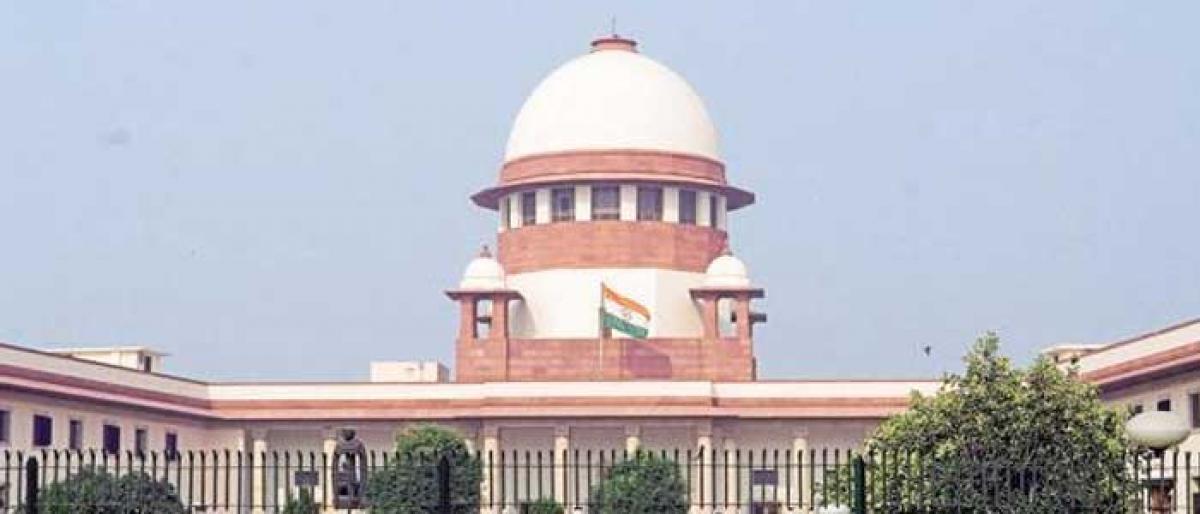Live
- GHMC Commissioner attends Prajavani, receives 126 applications
- 6 injured as lift crashes in Bahadurpura apartment
- CM Revanth: Delhi visits are in TG’s interests, scotches buzz on cabinet expansion
- Chandrababu Naidu Wishes People on Constitution Day
- World Heritage Week celebrations conclude
- Coronation of Vishvaraj as Mewar’s 77th successor starts amid questions over palace visit
- Give utmost priority to research: SKLTHU V-C
- IT Min launches ‘Transforming 10,000 Minds’ prog
- TTD Board member interacts with locals in Tirumala
- Uttam prods babus to fast-track irrigation projects across State
Just In

If Article 35A relating to special rights and privileges of the citizens of the Jammu and Kashmir is ultra vires of the Constitution or if there is any procedural lapse, the issue may be dealt with by a five-judge constitution bench, the Supreme Court indicated on Monday.
New Delhi: If Article 35A relating to special rights and privileges of the citizens of the Jammu and Kashmir is ultra vires of the Constitution or if there is any procedural lapse, the issue may be dealt with by a five-judge constitution bench, the Supreme Court indicated on Monday.
A bench of Justices Dipak Misra and A M Khanwilkar tagged the issue along with a similar pending matter for hearing by a three-judge bench later this month. "If this matter requires to be heard by a five-judge constitution bench, then the three-judge bench which will hear the matter may refer it," the bench said. During the hearing, counsel for Jammu and Kashmir government told the bench that the issue of Article 35A has been "prima facie settled" by the state High Court in its verdict passed in 2002.
The apex court was hearing a plea filed by Charu Wali Khanna challenging Article 35A of the Constitution and Section 6 of the Jammu and Kashmir Constitution which deal with the "permanent residents" of the state.
The plea has challenged certain provisions of the Constitution which deny property right to a woman who marries a person from outside the state. The provision, which makes such women from the state to lose rights over property, also applies to her son.
Article 35A, which was added to the Constitution by a Presidential Order in 1954, accords special rights and privileges to the citizens of the Jammu and Kashmir.
It also empowers the state's legislature to frame any law without attracting a challenge on grounds of violating the Right to Equality of people from other states or any other right under the Indian Constitution. "Section 6 of the Jammu and Kashmir Constitution restricts the basic right of women to marry a man of their choice by not giving the heirs any right to property if the woman marries a man not holding the Permanent Resident Certificate.
"Her children are denied a permanent resident certificate thereby considering them illegitimate -- not given any right to such a woman's property even if she is a permanent resident of Jammu and Kashmir," the plea, filed through advocate Bimal Roy Jad, said.
The petitioner said that as per the provisions, if a woman marries a person outside Jammu and Kashmir, then she loses property rights as well as employment opportunities in the state. While Jammu and Kashmir's Non-Permanent Resident Certificate holders can vote in Lok Sabha elections, the same individual is barred to vote in local elections in the state.
In a related matter filed by the Delhi-based NGO 'We The Citizens' challenging Article 35A of the Constitution, a bench headed by the Chief Justice had referred the case to a larger bench.

© 2024 Hyderabad Media House Limited/The Hans India. All rights reserved. Powered by hocalwire.com







